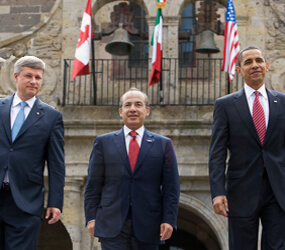GUADALAJARA, Mexico – Catholic advocates working with undocumented Mexican migrants heading toward the United States questioned whether President Barack Obama was serious about his Aug. 10 pledge to seek reform of U.S. immigration policies.
Speaking after the Aug. 9-10 meeting of Obama, Mexican President Felipe Calderon and Canadian Prime Minister Stephen Harper in Guadalajara, the advocates urged the U.S. leader to spend some of his “political capital” on immigration issues in the same way he is addressing the economy and health care reform.
At the summit’s conclusion Obama said immigration reform remains a priority of his administration and that a draft bill probably would be introduced by the end of this year. He cautioned, however, that “I’ve got a lot on my plate,” and said immigration reform would be addressed after the current health care debate concludes.
“For Obama, it’s a promise, not a project,” said Father Pedro Pantoja, director of the Saltillo Diocese’s migrant shelter in northern Mexico, reacting to Obama’s comments. The priest acknowledged that economic conditions in the U.S. remained unfavorable for addressing immigration reform.
Marta Sanchez, coordinator of the advocacy group Movimiento Migrante Mesoamericano, agreed.
“We recognize that these are tough conditions, but he’s obviously not willing to spend his political capital on this matter,” she said. “We’ve heard promises before.”
But one priest, Father Luis Cobacame, spokesman for the Hermosillo Archdiocese in northwestern Mexico, questioned the wisdom of Mexicans lobbying for U.S. immigration reform. He said the Mexican government should tend to the social and economic needs in the marginalized regions of Mexico that force thousands of migrants northward instead of lobbying for immigration reform in the U.S.
“Immigration reform doesn’t resolve poverty issues in Mexico,” Father Cobacame said.
Lobbying for immigration reform, he explained “has been a pretext for delaying development, mainly in education and the countryside. An economy has developed instead that is based on migration and remittances.”
At the conclusion of the summit, Obama said a system that offers strong border security and an orderly process for people to enter the U.S. was possible.
“But we’re also giving an opportunity for those who are already in the United States to be able to achieve a pathway to citizenship so they don’t have to live in the shadows,” Obama said.
Along with immigration, the three leaders also discussed helping Mexico’s police forces in an ongoing crackdown on organized crime, the economic crisis, possible outbreaks of the H1N1 virus and trade frictions.
Still, much of the attention at the summit – at least in Mexico – focused on immigration, including the July 13 Canadian decision to require visas for all Mexicans traveling to Canada.
Harper told reporters that the new requirement would remain unchanged and was necessary because of a flood of invalid refugee claims filed by Mexican travelers. Some 89 percent of the refugee claims filed by Mexicans in 2008 were rejected, according to Citizenship and Immigration Canada.
Francine Garneau, spokeswoman for the Canadian Conference of Catholic Bishops, said the organization had no comment on the visa issue.
Despite the disagreement over the new visa rules, the Mexican and Canadian leaders agreed that other programs to facilitate orderly migration between Canada and Mexico would be expanded. One program, in existence for 35 years, takes Mexican agricultural workers to Canada each summer so they earn at least the provincial minimum wage and receive social benefits.


